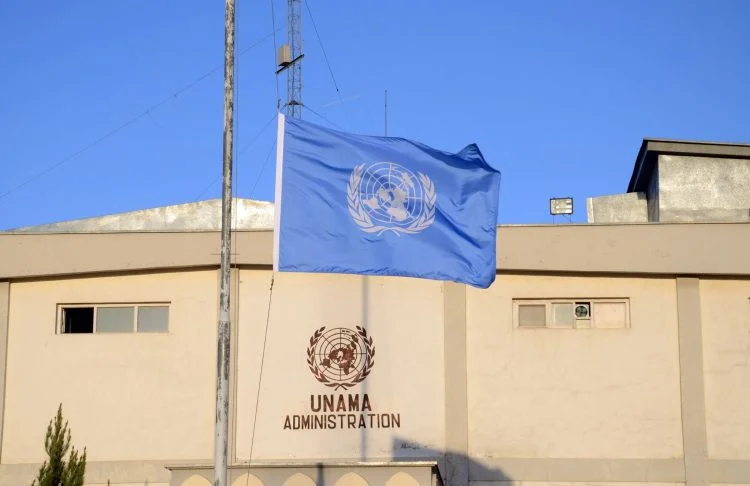Prime Minister Shehbaz Sharif criticized the United States on Tuesday for imposing fresh sanctions on Pakistan’s ballistic missile program, emphasizing that the program is purely for deterrence and not for aggressive purposes.
Speaking at a federal cabinet meeting in Islamabad, Sharif stated, “The sanctions placed upon our National Development Complex and other entities have no justification. Pakistan has absolutely no intention for our nuclear system to be aggressive. It is 100 percent for Pakistan’s defence; nothing else.”
Prime Minister Shehbaz Sharif on Tuesday criticized Washington for imposing fresh sanctions on Pakistan’s ballistic missile program, saying it was intended only for deterrence purposes and not for aggressive designs.
Also See: Pakistan Slams US Sanctions on Ballistic Missile Programme
The US State Department announced on Dec. 18 that it was imposing more sanctions related to nuclear-armed Pakistan’s long-range ballistic-missile program, including on the state-owned defense agency that oversees the program. The sanctions freeze any US property belonging to the targeted entities and bars Americans from doing business with them.
State Department spokesperson Matthew Miller said in a statement that the measures slapped on the National Development Complex (NDC) and three firms were imposed under an executive order that “targets proliferators of weapons of mass destruction and their means of delivery.”
Pakistan’s foreign office responded sharply to the announcement the same day, describing the move as “double standards and discriminatory practices,” warning it endangered regional and international peace and security.
“The sanctions imposed on the National Development Complex and other firms, there is no justification for it,” Sharif told members of the federal cabinet during a meeting. “Pakistan does not harbor any intentions in which its nuclear system is aggressive, it is 100 percent in Pakistan’s defense. It is just deterrence, nothing else,” he added.
Sharif said Pakistan’s nuclear program did not belong to either him or members of the federal cabinet. Rather, he said it belonged to the 240 million people of the country.
“There will be no compromise on it [nuclear program] and the entire nation is completely united on this,” the Pakistani premier declared.
A State Department factsheet said the Islamabad-based NDC had sought to obtain components for Pakistan’s long-range ballistic-missile program and missile-testing equipment. It said the NDC “is responsible for the development of Pakistan’s ballistic missiles,” including the Shaheen family of missiles.
The Bulletin of the Atomic Scientists research organization says the Shaheen series of missiles is nuclear-capable. Pakistan conducted its first nuclear-weapons test in 1998, becoming the seventh country to do so. The Bulletin estimates Pakistan’s arsenal at about 170 warheads.
Islamabad has refused to sign the Non-Proliferation Treaty (NPT), the cornerstone of the international system designed to prevent the spread of nuclear weapons, asserting that it is a sovereign decision driven by the need to maintain a credible deterrent against regional threats. Pakistan maintains that its nuclear program is for self-defense, rather than offensive purposes, and is vital for regional stability.
Interestingly, India, which is also a nuclear-armed state, has managed to evade similar sanctions imposed by the United States despite its refusal to sign the NPT. India has been engaged in a strategic partnership with the US, particularly in defense, technology, and trade, which has led to its exclusion from sanctions that typically target nuclear proliferators. This disparity in treatment between Pakistan and India has raised concerns over perceived double standards in US policy, with Pakistan viewing it as a significant factor undermining trust and cooperation between the two countries. Pakistan continues to emphasize that its nuclear deterrent is essential for national security and is not a challenge to any other nation’s sovereignty or peace.
Pakistan’s stance is that its nuclear capabilities are a necessary part of its defense strategy in the face of regional instability and threats. The imposition of sanctions, according to Pakistani leadership, serves no productive purpose and only exacerbates tensions in an already fragile security environment. The government has reiterated its commitment to peaceful coexistence but insists that it will not compromise on its nuclear sovereignty, as it is deeply tied to the security and defense of the nation.
The ongoing situation highlights a broader issue of how nuclear policies are selectively enforced on countries, depending on geopolitical alliances and strategic interests, raising questions about the fairness and consistency of international non-proliferation efforts. As such, Pakistan has called for a more equitable and transparent global approach to nuclear non-proliferation, one that does not discriminate based on geopolitical biases.
This news report is sourced from Arab News Pakistan and Dawn with input from SAT News Desk.

![Prime Minister Shehbaz Sharif criticizes US sanctions on Pakistan’s ballistic missile program, emphasizing deterrence, not aggression. [Image via PID/File]](https://southasiatimes.org/wp-content/uploads/2024/12/4557596-1785277934.webp)




